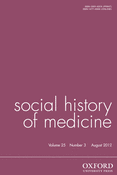-
Views
-
Cite
Cite
Markku Hokkanen, Imperial Networks, Colonial Bioprospecting and Burroughs Wellcome & Co.: The Case of Strophanthus Kombe from Malawi (1859–1915), Social History of Medicine, Volume 25, Issue 3, August 2012, Pages 589–607, https://doi.org/10.1093/shm/hkr167
Close - Share Icon Share
Abstract
Recent research has begun to highlight the complex connections between colonialism, medical and scientific knowledge-production, and commercial interests. This article analyses colonial ‘bioprospecting’ through a case study of Strophanthus kombe. Used locally as an arrow poison, Strophanthus was ‘discovered’ in Malawi during David Livingstone's Zambesi expedition. After investigation and experimentation it was subsequently used to produce a cardiac drug. The Malawian case study complements previous work on Strophanthus from West Africa. It uncovers the early Scottish-Central African networks that linked the Shire valley (the source of Malawian kombe seeds), with medical research in Edinburgh and Burroughs Wellcome and Co., the first commercial manufacturer of drugs derived from Strophanthus. The article also analyses Burroughs Wellcome's use of scientific and local knowledge in the early marketing of its first original drugs.




